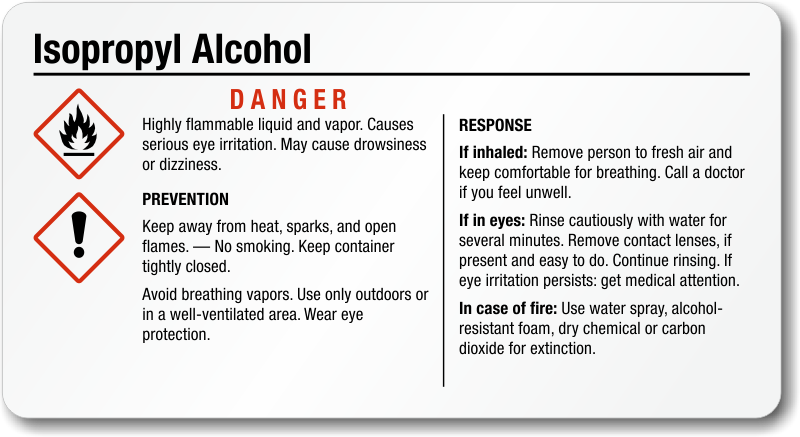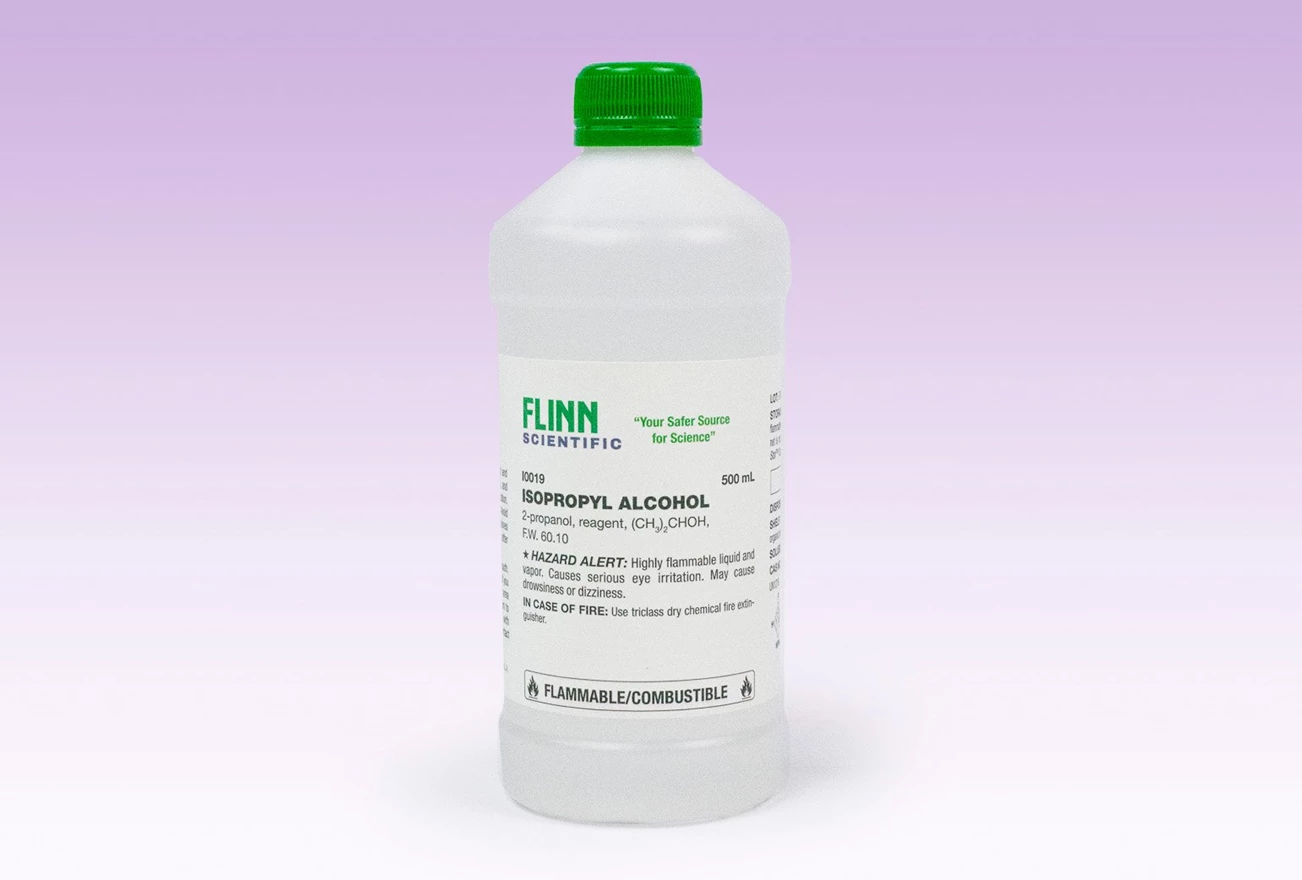Whether it was messing around in your middle school chemistry laboratory or using isopropyl alcohol to clean a wound, you must have had your experience with the chemical at least once in your life. However, have you ever thought about what risks it carries when inhaled?
In this post, we will dive into the one question often thought but seldom asked: Can inhaling isopropyl alcohol kill you? Brace yourself for an engaging and informative journey as we separate fact from fiction, debunk myths, and provide you with the knowledge you need to make informed decisions about this common household chemical.
Table of Contents
ToggleWhat is Isopropyl Alcohol?
Before we begin with the actual topic, we need to start with the basics. For those who may not be familiar with this liquid, isopropyl alcohol is also known as rubbing alcohol. Isopropyl has a distinct smell that can be described as sharp and intense. Its versatile nature reaches our homes, workplaces, and medical facilities.
Many of us have reached for a bottle of isopropyl alcohol to clean wounds or sterilize surfaces, but its uses extend beyond that. You’ll often find it in first aid kits, where it’s used to clean wounds and sterilize medical equipment. It’s also common in hand sanitizers, cleaning products, and personal care items like aftershave.
But what makes isopropyl alcohol so handy in these applications? Well, it possesses potent antimicrobial properties, meaning it can help eradicate harmful germs and reduce the risk of infection. It’s also an excellent solvent, able to dissolve oils, greases, and other substances that might be stubborn to remove.
Isopropyl alcohol is readily available in different concentrations, typically 70% to 99%. The higher the attention, the more potent it is in terms of its antimicrobial properties. However, it’s worth noting that higher concentrations can also be more hazardous to handle and may have more stringent safety precautions.
Now that we’ve covered the basics of isopropyl alcohol, it’s time to delve deeper into the potential risks of inhaling its fumes.
The Dangers of Inhaling Isopropyl Alcohol

While isopropyl alcohol has many practical uses, inhaling its fumes can pose significant risks to your health. When isopropyl alcohol vapor enters your respiratory system, it can cause a range of adverse effects that should not be taken lightly.
One of the immediate sensations you might experience when inhaling isopropyl alcohol fumes is a burning sensation in your nose, throat, and lungs. This discomfort is a warning sign that the fumes are irritating and potentially harmful.
Inhaling large amounts of isopropyl alcohol vapor can lead to feeling nauseated and dizzy, not to mention the terrible headaches that accompany it. These symptoms occur because alcohol interferes with the normal functioning of your central nervous system, affecting your balance, cognition, and overall well-being.
In more severe cases, prolonged or concentrated exposure to isopropyl alcohol fumes can result in confusion, disorientation, and even loss of consciousness. These effects can be dangerous, mainly in situations where coordination and awareness are crucial.
The Lethal Threshold of Inhaling Isopropyl Alcohol
The lethal threshold refers to the concentration of isopropyl alcohol vapor in the air that can cause life-threatening effects or even death. It’s important to note that reaching this threshold is highly unlikely in typical, everyday scenarios of using isopropyl alcohol for cleaning, disinfection, or personal care.
To reach a lethal concentration of isopropyl alcohol vapor, one must be exposed to extremely high levels for an extended period. An example is in a confined space with poor ventilation where you are likely to inhale 160-240 ml of isopropyl alcohol. Intentional misuse, such as purposefully inhaling large quantities of concentrated vapor, can also increase the risk.
It’s worth mentioning that individual tolerance to isopropyl alcohol inhalation varies, and some people may be more susceptible to its effects than others. Certain factors like any pre-existing respiratory conditions, age, and overall health can ultimately influence how someone responds to inhaling isopropyl alcohol fumes.
Now that we understand the potential dangers of inhaling isopropyl alcohol, we must take steps to minimize the risks.
Avoiding the Risks of Inhaling Isopropyl Alcohol
When it comes to isopropyl alcohol inhalation, prevention is key. Minimize risks and protect yourself and others with simple precautions. Here are some practical tips to help you avoid the potential dangers:
Ensuring Proper Ventilation
Whenever you use or handle isopropyl alcohol, make sure you’re in an area that’s well-ventilated to minimize risks. To help disperse any present fumes, make sure to open the windows or turn on fans for air circulation.
Maintaining a Safe Distance
When using isopropyl alcohol, keep your face and body at a safe distance from the source. Avoid directly inhaling the fumes or bringing the container too close to your nose or mouth.
Avoiding Prolonged Exposure
Minimize exposure to isopropyl alcohol vapor by keeping the duration of contact as short as possible. If you’re cleaning or using the substance for an extended period, consider taking breaks in fresh air to reduce continuous inhalation.
Personal Protective Equipment (PPE)
If you anticipate prolonged exposure or will be working with concentrated forms of isopropyl alcohol, consider wearing appropriate personal protective equipment. This may include a protective mask for your eyes, respiratory system, and skin, some goggles, and gloves.
Following Instructions
Isopropyl alcohol labels contain instructions to follow. They often contain important safety information and usage guidelines that can help you minimize risks.
Adequate Storage
Ensure you store isopropyl alcohol containers tightly and safely, away from heat sources and open flames. This reduces the likelihood of accidental spills or ignition, preventing unnecessary exposure to the fumes.
Remember, while isopropyl alcohol has numerous practical applications, it’s essential to prioritize your well-being and the well-being of those around you. Stay informed, stay safe, and let’s move forward to the next section, where we discuss what to do in case of inhalation-related emergencies.
Conclusion
If severe symptoms such as chest pain, difficulty breathing, or loss of consciousness occur due to significant isopropyl alcohol inhalation, seek immediate medical attention for yourself or someone you know. Don’t hesitate to contact your local poison control center or emergency services for guidance on handling the situation.
By understanding the potential dangers and adopting safe practices, you can continue to benefit from isopropyl alcohol’s uses while prioritizing your well-being. Stay safe and breathe easy!

I am a passionate beer connoisseur with a deep appreciation for the art and science of brewing. With years of experience tasting and evaluating various beers, I love to share my opinions and insights with others and I am always eager to engage in lively discussions about my favorite beverage.
















